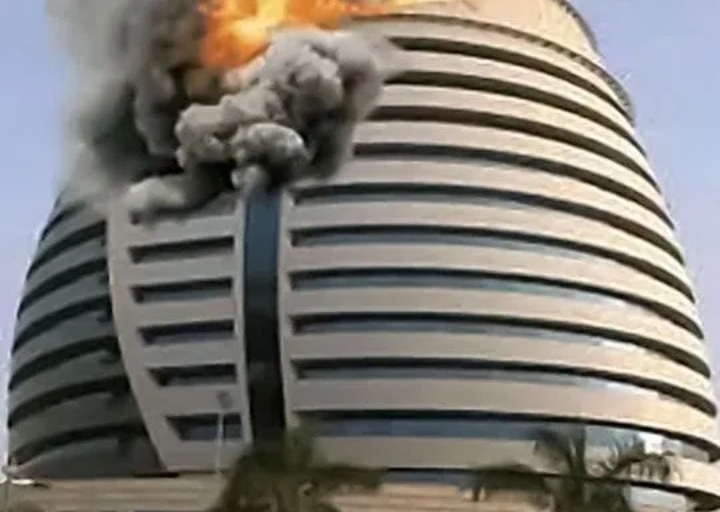Flames gripped the Sudanese capital on Sunday and paramilitary forces attacked the army headquarters for the second day in a row, witnesses reported, as fighting raged into its six month.
Central Khartoum in Flames as War Rages Across Sudan


Sudan's paramilitary forces have attacked the army headquarters in Khartoum, according to reports on Sunday.
City residents told the AFP news agency they heard "huge bangs" in the capital. A fire also broke out in Khartoum's landmark Greater Nile Petroleum Oil Company Tower.
Witnesses also reported fighting in the city of El-Obeid, 350km (about 220 miles) south.
44-year-old Nawal Mohammed said battles on Saturday and Sunday between the regular army and the paramilitaries had been “the most violent since the war began”.
Her family lives at least 3km away from the nearest clashes but Mohammed said “doors and windows shook” with the force of explosions, while several buildings in central Khartoum were set alight.
Posts on social media show the skyscraper in flames. But it is unclear how the fighting started, Sudanese media said it was the result of fighting between the army and the paramilitary Rapid Support Forces (RSF).
Posts showed other buildings smoldering. The buildings had bullet holes in the walls and windows. Witnesses reported fighting in the city of El Obeid, which lies some 350 kilometers (220 miles) south of the capital, AFP reported.
An airstrike on an open market in Khartoum last weekend killed at least 40 civilians too, according to activists and medical workers.
The latest escalation comes as world leaders make their way to New York City to attend the UN General Assembly.
Sudan has been gripped by fighting by factions opposed to one another — the Sudanese army led by Abdel Fattah al-Burha and the RSF led by General Mohamed Hamdan Dagalo.
The fighting first broke out in April, after the relationship between the two broke down during discussions to integrate the RSF into the country's military and to pave the way for civilian rule.
“It’s distressing to see these institutions destroyed like this,” Badr al-Din Babiker, a resident of the capital’s east, said.
Some 7,500 people have been killed in the fighting, according to the Armed Conflict Location & Event Data Project. Aid groups put the toll much higher, since many of those injured or killed never make it to the hospitals.
The fighting has also displaced millions of people, according to the United Nations. Efforts by Sudan's neighbors as well as the US and Saudi Arabia to resolve the situation has so far failed.
Millions who could not or refused to leave Khartoum remain in the city, where water, food and electricity are rationed.
The violence has also spread to the western region of Darfur, where ethnically motivated attacks by the RSF and allied militias have triggered renewed investigations by the international criminal court into possible war crimes.

 বাংলা
বাংলা  Spanish
Spanish  Arabic
Arabic  French
French  Chinese
Chinese 
